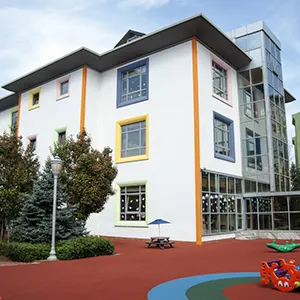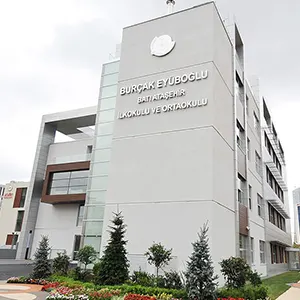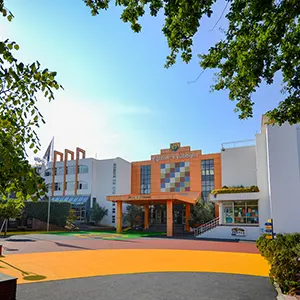PRIMARY SCHOOL ACADEMIC PROGRAM
PRIMARY SCHOOL ACADEMIC PROGRAM
Our educational program, guided by the philosophy that learning occurs through curiosity, asking questions, seeking answers, and posing new questions, is designed to enable our students to acquire advanced thinking skills. It encompasses all the requirements of the National Curriculum and the International Baccalaureate Primary Years Program.
Throughout their learning journey, our students take responsibility for their own learning, engage in decisions that affect them, and take initiative to create change in the learning process. Hearing the voices of students regarding their own learning, observing their choices, and fostering a sense of belonging are priorities of the school community.
In learning environments enriched with a variety of materials and advanced information technology tools, our students experience a lasting and enjoyable learning experience through the "Differentiated Education" program, which takes into account individual differences.
The program not only focuses on acquiring advanced academic skills but also supports the development of character, which is a crucial part of education. It aims to help students develop a solid profile and behaviors that will form the basis for their future lives, fostering individuals with national and international values who aspire to create a better and more peaceful world.
In Turkish lessons, our students engage in creative activities that are actively connected to life in order to use their mother tongue effectively. These activities encompass listening, speaking, reading, writing, and visual literacy. Through these activities, the aim is for students to develop active listening and reading skills, and to enhance their speaking and writing skills to express their thoughts, feelings clearly in a way that everyone can understand. In addition, various visual elements such as diagrams, tables, graphs, images, and films, which have become widely used in today's world, are incorporated into Turkish lessons to improve students' comprehension and expression skills.
Turkish lessons, conducted in a student-centered approach, involve students in exploring examples from Turkish and world literature as they progress through the primary school levels. Alongside national, universal, and cultural values, students develop skills such as critical text interpretation, oral presentation, drama studies, projects, creative writing, research-based problem-solving, and ethical use of information obtained from sources.
The Eyüboğlu Primary School English program is designed to support students in becoming globally conscious citizens who appreciate different cultures with tolerance, express themselves fluently and accurately, and possess high self-confidence as bilingual individuals.
Structured within the framework of the six themes of the International Baccalaureate Primary Years Program (PYP) inquiry program and developed uniquely for Eyüboğlu, our English program aims to provide students with not only language proficiency but also knowledge about various topics and themes. It encourages independent learning, inquiry, and the ability to express ideas verbally and in writing in the most accurate and fluent manner while fostering creative thinking.
The English program, tailored to the age characteristics and needs of students, features a gradual progression with the addition of new information and skills on top of what is already known. Throughout the primary school, students develop language skills such as speaking, listening, reading, writing, and visual literacy through different types of fictional and non-fictional texts. They also learn grammar rules necessary for using the language accurately. The curriculum, designed to actively and effectively utilize language skills, is supported by various digital resources, books, and magazines.
With an experienced teaching staff consisting of both foreign and Turkish teachers, the program emphasizes individual needs and implements differentiated activities. Feedback is provided to students aiming to elevate their knowledge and skills to their fullest potential. By the end of the fourth grade, our students can comfortably express themselves both verbally and in writing in English-speaking environments.
Our students consistently achieve success above Turkey and world averages in the Cambridge Young Learners exams, which assess language skills in speaking, listening, reading, and writing.
The Life Sciences program, created by integrating the International Baccalaureate Primary Years Program (IBPYP) and the Ministry of National Education programs, aims to help students develop a personal and cultural identity while acquiring the knowledge and skills necessary for active participation in their groups, communities, and the world.
Under the inquiry units defined under the topics of Systems and Economic Activities, Social Organization and Culture, Continuity and Change, Human and Natural Environment, and Resources, our students question the groups to which people belong, their roles within the group, the connections between systems, why certain places are important to people, and how and why human activities impact the spaces around them.
The Learner Profile, representing the characteristics of effective learners and individuals with international awareness, is an integral part of teaching and learning. Our students develop a sense of time by recognizing significant events in their lives and understanding how time and change affect people. They explore ways in which communities reflect their cultures and traditions, discover the relationship between valuing the environment and preserving it, and grow into informed, open-minded, and sensitive individuals.
Through inquiry supported by trips, interviews, and rich resources, students are encouraged to develop behaviors and habits as individuals who can quickly adapt to a changing world, becoming knowledgeable, confident, and responsible individuals.
Mathematics, being a universal language, plays a crucial role in developing analytical and systematic thinking skills. In our mathematics lessons, created by integrating the International Baccalaureate Primary Years Program (IBPYP) and the Ministry of National Education programs, the goal is for students to become competent users of the language of mathematics and to start using it as a way of thinking rather than seeing it as a set of memorizable equations.
In line with this goal, mathematics lessons cover the topics of data handling, measurement, shape and space, pattern-function, and numbers. Students are actively involved in a learning process that provides interesting, manipulative interactions, and opportunities for collaborative work with their peers. Throughout the learning process, they explain what they understand using their own symbolic representation methods and learn to translate these representations into traditional mathematical notation.
Through applied problem-solving activities and unique exercises that involve realistic situations, students apply the mathematical concepts they have learned and the skills they have developed to solve various real-life problems. The aim is to foster a mindset where students perceive mathematics as a tool for problem-solving in diverse real-life scenarios, rather than just a set of abstract concepts.
In the social studies curriculum, through important and universal concepts common to all societies and international content, our students engage in inquiries covering Systems and Economic Activities, Social Organizations and Culture, Continuity and Change, Natural Environment, and Access to Resources. Through individual and collaborative inquiries using various sources, they evaluate different perspectives, develop skills, and gain knowledge and conceptual understanding.
Through inquiries based real-life situations, our students experience the ability to look realistically, objectively, and sensitively at human behavior and activities. They are encouraged to take actions to reduce prejudice and discrimination in their immediate surroundings, society, and the world. The Social Studies course promotes intercultural understanding in students and encourages respect for individuals, their values, traditions, and differences.
The International Baccalaureate Primary Years Program (IBPYP) science lessons encompass the exploration of the biological, chemical, and physical aspects of the natural world and the relationships between them. These lessons aim to help students perceive the world through a scientific perspective, think critically about scientific knowledge, and develop a sense of responsibility for the impact of their actions on the world. The focus is on inquiry, which places scientific research and understanding at the center, allowing students to integrate scientific knowledge with reasoning and thinking skills to develop an understanding of the world around them.
The science curriculum is organized under the topics of "Living Things," "Earth and Space," "Matter," and "Force and Energy" and provides students with meaningful learning environments where they can create their own questions, seek answers to their questions, and engage in in-depth inquiry through research, experimentation, and observation. Throughout the learning process, students are given the opportunity to observe, use the correct tools, record and compare data, and conduct research using their own scientific experiences in all planned activities.
Through experiments conducted in the laboratory, students test their assumptions, plan systematic research following the steps of the scientific method, interpret data to draw conclusions, and gain experience in critical thinking. This process helps them develop habits and attitudes towards becoming lifelong learners.
In today's world, technological advancements are widely used in every aspect of life, leading to various changes. We highly prioritize the conscious use of technology in accordance with secure, ethical, and legal principles, considering the responsibilities that come with these changes and applications.
The fundamental goal of the Information Technologies course is to instill behavioral norms related to the use of technology in our students. We aim to support them in becoming digital literates through appropriate tools and methods, and to nurture their ability to produce and shape the future of technology by using information.
To achieve this goal, our students engage in computer-free, online, block, line, and robotic coding activities tailored to their age levels. They develop design skills by creating three-dimensional designs and can bring their designs to life by printing them using 3D printers in computer laboratories. Both in real life and the virtual world, a Digital Citizenship curriculum developed with the support of Harvard University's research center, Project Zero, is implemented at all levels to ensure that students grow into conscious and responsible individuals.
The Primary Physical Education and Games curriculum, created with consideration for students' age and developmental characteristics, encompasses a variety of physical activities aimed at improving endurance, agility, flexibility, coordination, strength, and rhythm. Through individual and group exercises, students engage in activities that promote self-awareness, self-confidence, communication, and movement skills. Exercises focused on the development of fundamental motor skills are conducted through games and activities.
The Primary Physical Education and Games course is designed within the framework of the Ministry of National Education and the International Baccalaureate Primary Years Program (IBPYP) curricula. It covers various sports such as athletics, gymnastics, basketball, handball, volleyball, and includes swimming lessons once every three weeks during the Physical Education and Games class. In swimming lessons, students not only enhance their physical development but also learn the technical and coordination skills of different swimming styles, including freestyle, backstroke, breaststroke, and butterfly.
Additionally, at the beginning of each academic year, talent screenings are conducted, and students who demonstrate skills and interest join the school teams and Eyüboğlu College Youth Sports Club teams. Students in our school and club teams, under the supervision of expert coaches, engage in after-school training sessions to compete successfully in Istanbul, Turkey, and World Championships in various sports disciplines (such as fencing, gymnastics, dance, chess, basketball, swimming, handball, tennis, volleyball). Furthermore, students actively participate in club activities, choosing from academic, artistic, and sports clubs to further develop their skills. Those who excel and show talent in these clubs are included in school and club teams, representing our school in interscholastic and interclub competitions.
In the Visual Arts course, students are encouraged to inquire and explore their surroundings through art education, following the International Baccalaureate Primary Years Program (IBPYP). Under the unit titles of composition in painting, color values, three-dimensional design, and art analysis, our students express their emotions and thoughts freely using art materials such as waste materials, pastel colors, watercolors, and ceramic clay.
Within the scope of our classes, students research different artists, their life stories, styles, and materials they use. They draw inspiration from these artists and encounter the works of many artists face to face and through online exhibitions.
Our lessons, conducted in our art studios named after artists like Vincent Van Gogh, Pablo Picasso, Joan Miro, and Henri Matisse, are planned based on students' talents and learning styles.
Club activities such as Cartoon, Painting-Handicrafts, digital art, and ceramics, as well as after-school art activities, focus on developing students' individual talents. The artworks of students meet the audience not only on the walls of our schools but also through online and face-to-face exhibitions.
Music education, which plays an important role in supporting students' personal, cognitive, and social development, aims to enhance their perception and learning capacities, establish physical and mental coordination, discover their individual talents, improve their ability to work in groups, and foster a sense of responsibility.
In line with the International Baccalaureate Primary Years Programme (IBPYP) curriculum we implement, we aim to help our students recognize and further develop their physical, social, intellectual, aesthetic, and cultural capacities through music education. In music classes, our students learn to recognize rhythm instruments and play them with the correct technique, sing songs in the right pitch with piano accompaniment suitable for their levels, move to the rhythm of the music they hear, and begin their training in solfege and notation while also learning about basic instruments and instrument families. The use of interactive smart boards and various music software in our music classrooms enables our students to actively engage in the lessons with different instruments.
Through the applied music education, our students not only develop musical talents but also gain an artistic perspective, providing them with a well-rounded foundation. We encourage our students to listen to various music styles and genres, learn musical concepts such as tempo and pitch, get to know different artists, engage in composition work, and give performances. They also participate in school concerts.
At the beginning of each academic year, talent screenings are conducted by the Performing Arts Department teachers to guide our students according to their abilities. In accordance with the talent screenings, students who play instruments showcase solo performances in regular lunchtime recitals every week. Additionally, based on their vocal development, students participate in after-school practices and take on roles in the school choir.
In today's world, creativity is the most distinguishing factor in individuals making a difference. Eyüboğlu Educational Institutions, believing that in the ever-changing world, children need to be equipped with the skills to adapt to new situations, is the first Turkish educational institution to include a creativity course in its curriculum.
The Creativity and Thinking Skills courses aim to enrich students' imaginative worlds and enable them to develop the skills to generate fluent, original, detailed, and flexible ideas. The goal is to cultivate students who are not confined to standards but rather become better observers, versatile, open-minded, and creative thinkers. In creativity courses, students also acquire critical thinking, teamwork, time management, and problem-solving skills. In addition, techniques such as SCAMPER and Creative Problem Solving, which play a significant role in enhancing creative thinking are introduced to help students generate alternative solutions to the problems they encounter in their daily lives.
Our students, equipped with the skills they acquire in creativity lessons and clubs, participate in Destination Imagination competitions, the world's largest creativity organization. They consistently achieve top rankings in Turkey and represent our country at the (DI) World Finals held in the United States every year. In 2013, our students won the world championship in the Instant Challenge category. In 2017, they secured fourth place in the Improvisational category and tenth place in the Social Responsibility category. In 2019, our students earned the prestigious Da Vinci special award at the World Finals.
Chess, one of the world's oldest games and referred to as the "game of kings," enhances individuals' critical and strategic thinking skills.
In our schools, all first-grade students receive chess lessons, and students interested in chess continue their studies in our chess clubs offered in grades 2, 3, and 4. The chess classroom is equipped with a smart board and demonstration board for theoretical studies, along with chess sets for practical exercises. Students who learn the rules of chess, strategic thinking, and understanding their opponent's intentions develop interpretive skills and the ability to persevere with patience.
Since 1991, Eyüboğlu Educational Institutions have been pioneering the development of chess in our country through the "International White Elephant Tournament," one of the largest inter-school chess tournaments. All students who are willing to participate, in addition to our school teams, can join this major tournament organized by our school. Our students continue to make us proud with the successes they achieve in numerous national and international tournaments they participate in.



